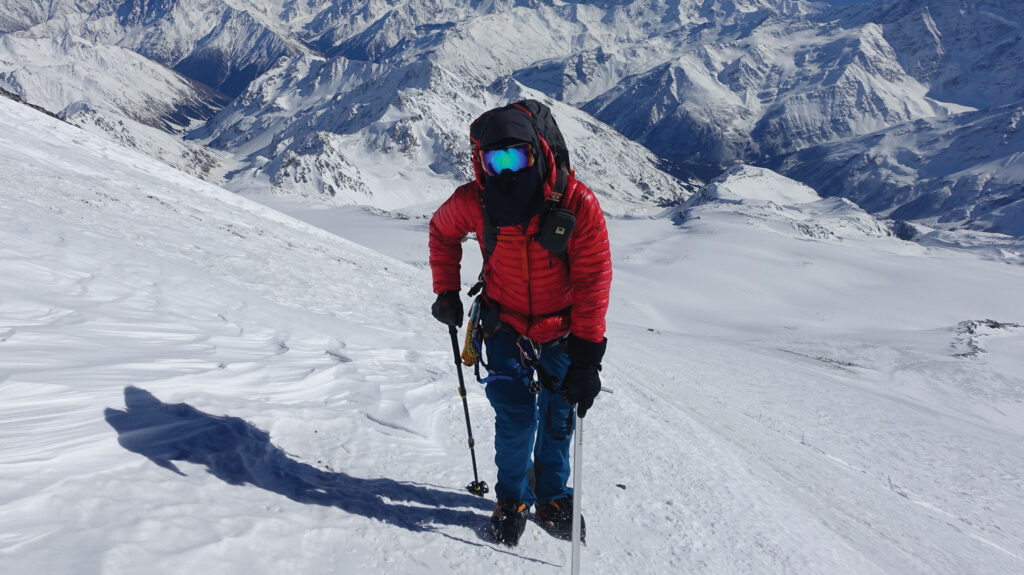Advertisement
Beating the Odds (Again and Again)
Elite mountain climber shatters records in support of kids' health

Colin O’Brady didn’t know if he’d ever walk again after an accident in Thailand left him severely burned on 25 percent of his body. That didn’t stop him from dreaming big.
Nine years later, the record-shattering athlete has completed triathlons in 25 countries, summited the tallest peaks on each continent and crushed the Explorers Grand Slam (more on that later).
Advertisement
The first step
Today, O’Brady is a testament to the power of overcoming great challenges. Back in Bangkok, however, his mom kept him focused when things got tough. She told him to set a goal and work toward it every day. A former collegiate swimmer, O’Brady decided to tackle a triathlon because it was a big athletic challenge, and he wasn’t about to settle for less.
“Racing the triathlon became my mission,” O’Brady says. “It helped to have a goal to focus on, and I began breaking it down into its smallest parts.”
The first step was to Google the actual distances for the running, biking and swimming components of the race. The second was to walk.
O’Brady’s mom continued to push him, encouraging her son to find the strength to take one step, then two and then five. The hard work and physical therapy paid off: 18 months later, O’Brady won the Chicago Triathlon, beating 4,000 other participants to the finish line.
“It was this micro process for this macro goal that led to success,” O’Brady explains, adding that the right attitude makes a difference. “Positivity is really important. Self-doubt happens when we are afraid to fail, but it’s a complete waste of time.”

Advertisement
The low points
This isn’t to say O’Brady never encountered setbacks. When the triathlete originally set out to complete the Explorers Grand Slam, a monumental test of endurance that requires the competitor to reach the highest mountain peak on each of the seven continents and ski the last degree to the North and South Poles, he had limited mountaineering experience.
In Russia, O’Brady fell into a crevasse while climbing Mt. Elbrus and had to self-rescue without a rope. He climbed to the last camp on Mt. Everest before a storm forced him to return to the bottom and start over two days later.
Throughout the challenging journey, O’Brady recalls coming back to a quote from Confucius: “The man who says he can and the man who says he cannot are both correct.”

Advertisement
The incredible highs
He could. On May 27, 2016, O’Brady shattered the Explorers Grand Slam’s speed record, completing the journey in 139 days. (The previous record was 192 days.) He also set a new speed record for the mountain-climbing portion by summiting all seven peaks in 132 days.
“When I really look back at the totality of this project, I realize I was built on day-by-day motivation,” O’Brady says. “It’s trite on some level, but it was about embracing the process or journey more than the destination.”
It all started with what O’Brady calls “a healthy foundation.” For him, that includes getting enough sleep and maintaining a clean diet comprised of salads, quinoa, lean protein and green smoothies with vegan protein powder.
On the journey, it meant obsessive handwashing and controlling his diet as best he could, eating lightweight freeze-dried food packets when trekking to the poles and taking dietary cues from buff Nepalese Sherpas. O’Brady also uses supplements to stave off inflammation and keep up his immunity.
Advertisement
His role models
“One thing that was less sexy but a huge part of my success was a day-to-day commitment to health,” he says, adding that a stomach flu or sprained ankle could have easily derailed the entire journey.
It certainly helped that O’Brady had healthy role models growing up. His parents always encouraged him to be active and get outside. They walked the walk, too. O’Brady’s mom and stepfather opened a chain of natural grocery stores in Portland, Oregon, and his father is an organic farmer in Hawaii.
After completing the Explorers Grand Slam, O’Brady spent a couple of months with his father, recovering and eating directly from the earth with farm-to-table bok choy, pineapple, mango and more in less than five minutes.
“I’m fortunate that my parents embedded healthy principles in me, but I realized not every kid has great role models,” he says.
This conclusion led O’Brady and his fiancée Jenna Besaw to found BEYOND 7/2. The organization, which raises funds and awareness about the increasing child obesity crisis, helped leverage the journey across seven peaks and two poles for a good cause.
Corporate sponsors like Nike, Columbia and Moosejaw funded the Explorers Grand Slam project. The charitable aspect of the journey was helped along by grassroots efforts, including one Colorado elementary school class that ran laps around the track to raise $680 for the cause.
“If we can reach kids when they are still sponges and are still figuring themselves out, we can create healthy communities from the ground up,” O’Brady says.
Advertisement
That one big goal
He believes it begins with a two-part process. When O’Brady works with kids, he starts by asking them about their personal Everest, that one big goal they want to achieve in life. After listening to their wide-ranging responses—everything from getting along with their siblings to being the first person in their family to finish college—he tells them the secret: When you start with a healthy foundation, any one of those goals is possible.
“When that underlying level of health isn’t there, it cripples them,” O’Brady says. “We want kids to have healthy minds and bodies so they can put that goal out there, learn, have setbacks, fail and move forward. They need to have faith in themselves to take the first step.”
PHOTOS BY BEYOND 7/2
PHOTOS BY BEYOND 7/2





